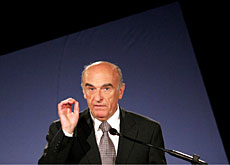Merz tax plans sidestep EU critics

Finance Minister Hans Rudolf Merz has ruled out further negotiations with the European Union over a tax dispute. But he plans to reform the company tax system.
Merz hopes to take the wind out of EU’s sails with a possible solution to the corporate tax row three days after its member states approved a mandate for negotiators to engage Switzerland.
The proposed corporate tax reform could defuse the controversy that centres on Switzerland’s policy of taxing company profits generated abroad differently from those made inside the country.
“The tax policy is a permanent building site,” Merz said in an interview with the Neue Zürcher Zeitung newspaper on Saturday. He indicated that he wants to turn his attention to a new round of company tax reform in a “non-hectic” manner.
“The goal might be to lower taxes on profits. Not because of the European Commission demands, but because the taxation of profits in other countries has been lowered in the past few years,” Merz said.
The EU appears to have scored an own goal with its demand for negotiations on abolishing tax privileges in Switzerland, according to Merz.
“Achieving a revision autonomously, that improves the tax climate, could hardly be in the interests of the EU politicians who view our current company taxation system as a thorn in their side,” he said.
But Merz does not yet have concrete plans for reaching the goal of reducing the tax burden on company profits. But he said the reform would “not necessarily” abolish the favourable tax treatment of holding companies that has been criticised by the EU because Switzerland has sovereignty over its own fiscal policy.
Billions could be lost
Informal discussions with EU finance ministers have thrown up hints that voluntary tax reforms in Switzerland could be enough to satisfy European critics. The same solution has been suggested by Swiss think tank Avenir Suisse in the last few days.
Merz left open the question of whether the reforms would deal with the issue of taxing domestic and foreign derived profits separately.
Abolishing this completely would result in the loss of around SFr14 billion ($11.6 billion) in tax revenues. “The country would not cope with a total abolishment and it would also not be fair,” he said.
Merz ruled out raising value added tax to compensate for losses through reform, but referred to a possible SFr8 billion that could be made through savings.
The second set of company tax reforms has yet to be sealed. The proposals were voted through by parliament in March but have since been halted in its tracks by a referendum from the centre-left Social Democrats.
swissinfo with agencies
Switzerland’s competitive tax system has come under the scrutiny of the European Commission, which questions whether tax breaks attracting foreign companies contravene the 1972 Free Trade Agreement.
The main bone of contention is that cantons give foreign firms with holding companies based in Switzerland preferential tax privileges by exempting tax on profits generated outside of the country.
Switzerland has reacted by pointing out that the same tax breaks also apply to many domestic companies and that it has not signed up to the EU’s tax code of conduct. It also says the Free Trade Agreement does not apply to taxation issues.
Several international companies have relocated to Switzerland from EU countries, including Kraft Foods that is moving its European headquarters to Zurich from London and Vienna this year.

In compliance with the JTI standards
More: SWI swissinfo.ch certified by the Journalism Trust Initiative











You can find an overview of ongoing debates with our journalists here . Please join us!
If you want to start a conversation about a topic raised in this article or want to report factual errors, email us at english@swissinfo.ch.